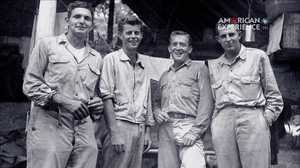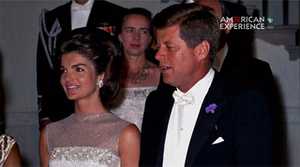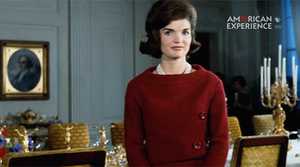Kennedy Meets Khrushchev
Kennedy believed his first diplomatic meeting with Nikita Khrushchev would be a lesson in compromise. But when it was clear the Soviet premier was unwilling to negotiate over Berlin and more than willing to talk casually about nuclear weapons, Kennedy told him "it's going to be a very cold winter." Kennedy left feeling uneasy.
Transcript:
Thomas Hughes, Assistant to Robert Kennedy: Despite all the briefings about what a crude, emotional peasant Khrushchev was, Kennedy couldn't have been prepared for what he was up against. Khrushchev thought of him as young, weak, ineffective, and probably a pushover. And Kennedy defended himself limply.
Timothy Naftali, Historian: Khrushchev wanted Vienna to be humiliating for the American president. That was the goal. There was nothing that Kennedy could say or do at Vienna that would have derailed Khrushchev's strategy. Kennedy walked into an ambush.
Robert Dallek, Historian: What he hopes to do is work out some kind of accommodation with Khrushchev over Berlin. The Soviets are chagrined by the fact that Berlin is a corridor of escape for people from the Eastern European satellite countries; that they're running out of there, fleeing Eastern Europe, where Communism is in control, to go to the West. And Khrushchev is embarrassed by this.
Narrator: The Soviet Premier was matter of fact in his presentation to Kennedy about Berlin. He was ready to unify the city under the control of his ally, East Germany, and to erase any U.S. and NATO presence in the city.
Robert Dallek, Historian: By the end of the meeting, Khrushchev says, "We're going forward. You press us, that's your problem." And Kennedy said, "It's going to be a very cold winter."
Michael Dobbs, Writer: Khrushchev talked about nuclear weapons in a very informal way that worried Kennedy. Kennedy, when he came out of that meeting with Khrushchev, was really shaken.
John F. Kennedy (archival): I will tell you now that it was a very sober two days. There was no discourtesy, no loss of tempers, no threats or ultimatums by either side, no advantage or concession was either gained or given, no major decision was either planned or taken. No spectacular progress was either achieved or pretended.
Timothy Naftali, Historian: He assumed certain things about Khrushchev that proved to be wrong. If this guy doesn't share my concern about nuclear danger, how am I going to deal with him over Europe? There was no ground that he could see for compromise. And that left Kennedy in a very dangerous situation. It left the country in a dangerous situation.







